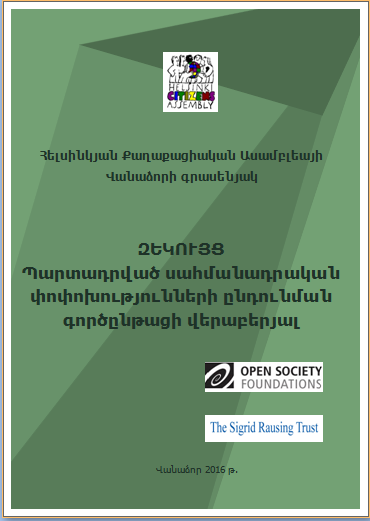By the RA President’s Decree № NH-207-N dated September 4, 2013, a Professional Commission on Constitutional Reforms was set up with the assignment to develop a Concept Paper for RA Constitutional Reforms and Draft Constitutional Reforms. According to the Decree above, the constitutional amendments were necessitated by “… the need for improvement of the constitutional mechanisms to ensure the application of the rule of law principle and guarantee fundamental human rights and freedoms, secure the perfect balance of powers and improve the efficiency of public administration.”
While it took the Commission headed by Gagik Harutyunyan, President of the RA Constitutional Court, 2 years to develop the Draft Constitutional Reforms, the public at large had no more than 2 months to get familiar with the Draft above and to discuss it in public debates. The RA National Assembly held only a 1-day public debate on the Draft. As for RA National Assembly deputies, they essentially discussed the Draft for only 4 days, and the final draft was delivered to them only 1 hour prior to the voting.
The public opinion surveys and observations by civil society organizations come to show that the constitutional amendments were not necessitated by the public interest and in fact failed to address the issues underlying the RA Presidential Decree. Both the process of constitutional amendments, and the solutions suggested under the Draft Constitutional Reforms to shift to the parliamentary system of governance were not required by the public but rather aimed to serve the political interests of a single political party and even of a single person. Therefore, the process of constitutional amendments appears to be premature and troublesome. Another issue of concern is the appropriateness of shifting to parliamentary system, given the current level of political and party system development (ideological, internal democracy, etc.) in the RA.
By the way, the approach to the shift from the semi-parliamentary governance system to the parliamentary one was not definitely enshrined in the Concept Paper for Constitutional Reforms. Hence, the shift prescribed in the Draft was driven by the political expediency.
Not only did the Draft Constitutional Amendments fail to settle a number of controversial human rights issues, but also posed most serious threats, mostly retained in the final Draft. The Constitutional Referendum was scheduled for December 6, 2015 and was held on that day.
The findings of the observation by HCA Vanadzor and other local organizations show that the Constitutional Referendum was accompanied by electoral frauds of unprecedented scale and impudence, and its official results have nothing to do with the reality. The constitutional amendments recognized through the referendum should be considered illegally imposed rather than adopted.
Numerous frauds and the apparent falsification of the Constitutional Referendum results suggest that the referendum was a failure, and the Draft cannot be deemed adopted.
Based on the findings of the observation mission, HCA Vanadzor found that:
– the constitutional reform process was non-democratic and non-participatory;
– the results of the December 6, 2015 Referendum were falsified.
The Report sums up the observations of HCA Vanadzor on the entire constitutional reform process and the frauds spotted during the referendum and throughout its preparation.
Please see the full report here

